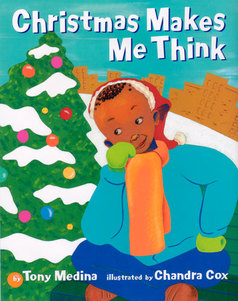TEACHER'S GUIDE FOR:
Christmas Makes Me Think
By Tony Medina
Illustrations by Chandra Cox
Synopsis
A young boy anticipates the coming Christmas holidays with no school, special foods, lots of presents, and trimmed trees. As the boy reflects on these traditions, he begins to think about all the trees that are cut down, the animals slaughtered for holiday meals, the excessive number of unneeded gifts, and the people who are hungry and homeless. The boy then considers ways to address these problems and make Christmas a true time of giving and sharing. This book was praised by School Library Journal for “its different look at the Christmas holiday."
Background
Christmas has always been a favorite time for Tony Medina. He says, “It was when my family and friends came together to share good times and good feelings—not to mention good food and presents!” However, as he grew up, Medina encountered people who had no place to live and he began to realize that not everyone was as lucky as he. With family and friends, he collected food and clothing for the homeless in his Harlem neighborhood. Medina recalls, “We stayed up all night cooking, until we could barely keep our eyes open. We fed over two hundred people, even whole families.” Readers of Christmas Makes Me Think will recognize this spirit of Christmas from Medina’s story.
| Teaching Tip This is an excellent selection to include in your collection of holiday books. |
Before Reading
Prereading Focus Questions
Before introducing the book, share the background information with students. Then you may wish to set the stage for reading with questions such as the following.
- Why do people celebrate holidays? What are some ways they celebrate them?
- What is your favorite holiday? Why? What is special about it?
- With whom do you usually spend your holidays?
- Why is education important? How can it make a difference in your life?
- What are some things you enjoy sharing with others? How does sharing make you feel?
Exploring the Book
Display the book and discuss the title with students. Ask them what might Christmas make them think about. What thoughts might the boy in the story be having?
Study the illustrations and encourage students to determine how the artist created them.
Read the dedications. Ask students if they offer clues to the story, and to the author’s and illustrator’s feelings.
Setting a Purpose for Reading
Have students read to find out why Christmas makes the boy think and what he thinks about.
Vocabulary
Students will be familiar with most words in this book, but you can reinforce meaning with this activity. Draw two large outlines of Christmas stockings on the chalkboard. Label the first stocking nouns and the second stocking adjectives, and write the words below in each stocking. Review that a noun names a person, place, or thing, and an adjective describes a noun. Then have students take turns making up oral sentences using at least one word from each stocking.
| Stocking 1: | Nouns | Stocking 2: | Adjectives | |
| time | presents | favorite | chocolate | |
| cake | turkey | big | bright | |
| tree | pigs | colorful | fancy | |
| lights | bulbs | lots | nice | |
| toys | clothes | good | homeless | |
| shoes | stocking | hot | ||
| hats | scarves | |||
| soup | songs |
After Reading
Discussion Questions
After students have read the book, use these or similar questions to generate discussion, enhance comprehension, and develop appreciation. Encourage students to refer back to the book to support their responses.
- Who is telling this story? How do you know?
- How does the boy feel about Christmas in the beginning of the story? How do his feelings change? Why do they change?
- Why does the boy worry about Christmas trees?
- How does the boy change his mind about turkeys and pigs at Christmas?
- What does the boy realize about his toys and clothes?
- Why does the boy think he should share his presents?
- What does the boy mean by being “new” Santas?
- What is the message of this book?
Literature Circles
If you use literature circles during reading time, students might find the following suggestions helpful in focusing on the different roles of the group members.
- The Questioner might use questions similar to those in the Discussion Questions section of this guide to help group members explore the book.
- The Passage Locator might look for ways that the boy’s feelings change.
- The Illustrator might draw scenes from the book using different media.
- The Connector might find other books with holiday themes.
- The Summarizer should provide a brief summary of each section that the group has completed.
- The Investigator might collect books and other materials with ideas for helping in a school or community.
There are many resource books available with more information about organizing and implementing literature circles. Three such books you may wish to refer to are: *Getting Started with Literature Circles* by Katherine L. Schlick Noe and Nancy J. Johnson (Christopher-Gordon, 1999), *Literature Circles: Voice And Choice in Book Clubs and Reading Groups* by Harvey Daniels (Stenhouse, 2002), and *Literature Circles Resource Guide* by Bonnie Campbell Hill, Katherine L. Schlick Noe, and Nancy J. Johnson (Christopher-Gordon, 2000).
Reader's Response
Use the following questions or similar ones to help students practice active reading and personalize their responses to what they have read. Suggest that students respond in reader’s journals, oral discussion, or drawings.
- Do you agree with the boy’s ideas of how to celebrate Christmas? Why or why not?
- What would you give up to make things better for someone else?
- The boy suggests that people could just visit a tree and give it presents. What present would you give a tree?
- Lots of children have toys they don’t ever play with. What ideas do you have for “recycling” such toys?
- How could people make Christmas last “a week, a month, or even a year”?
Other Writing Activities
You may wish to have students participate in one or more of the following writing activities. Set aside time for them to share and discuss their work.
- After reading Christmas Makes Me Think, students might write their own holiday stories.
- Some students may wish to write a proposal for a class activity to help others. Suggest students brainstorm ideas with a partner or in a small group beforehand.
- Have students turn to the page showing the boy sitting on a pile of presents. Ask them to imagine a gift that might be in one of the packages and then write a description of the gift without naming it. Students can then read their descriptions aloud for classmates to guess the gift.
- Some students might enjoy writing a menu for a holiday celebration.
ELL/ESL Teaching Strategies
These strategies might be helpful to use with students who are English language learners or who are learning to speak English as a second language.
- Make key words as concrete as possible by linking them to the art. Use the list of nouns in the Vocabulary section to help students make associations.
- Read the story aloud slowly, repeating lines for emphasis. Invite students to join in on subsequent readings.
- Use the illustrations in the book to expand students’ understanding and vocabulary. For example, for the first illustration the following statements could be made: The boy has on a blue jacket. He is carrying two bags. His mother is coming out of a store. There is a bike in the store window. There is a tree in the window.
Interdisciplinary Activities
To help students integrate their reading experiences with other curriculum areas, you might try some of the following activities.
Language Arts
1. Point out to students that some of the lines in this book rhyme, then challenge students to identify the rhyming words. Follow up by having students write their own rhymes about a holiday they enjoy.
2. Draw attention to the line “and presents piled to the moon.” Explain that this is an exaggeration. Tell students that writers sometimes use exaggeration to get the attention of readers when making a point. Encourage students to think of common exaggerations that people use and then to try writing their own.
Social Studies
1. At the end of the book, the author lists several ways that students can help out in their community. You might use the book as a way to launch your own class project for making a difference in terms of the environment, service programs, or helping the needy.
2. Start a bulletin board display of news clippings about different kinds of community celebrations. Place a United States map in the center of the display. Arrange the articles around the map and use colored yarn and thumbtacks to link each celebration with the town or city in which it takes place.
Math
Remind students that in the book, the boy hands out hats and gloves and scarves to homeless people. Present math problems relating to this idea. For example: It costs two dollars for a pair of mittens. How much will the boy need to buy ten pairs to give away? Have each student make up a problem, then set aside time for students to present their problems to the class for solving.
Science
In the story, the boy thinks it would be better to visit a tree and give it presents rather than cut down lots of trees to decorate. Have students look into other ways that communities deal with Christmas trees. For example, some people buy living trees that can be planted later. Others buy artificial trees that can be used for many years. Some communities recycle discarded trees by making mulch from them.
When students have completed their research, hold a tree conference. Based on their findings, students might consider making recommendations to your own community.

About This Title
Guided Reading:
JLexile:
AD750LInterest Level:
Grades K - 4Reading Level:
Grades 1 - 2Themes
Sharing & Giving, Religion/Spiritual, Home, Holidays/Traditions, Families, African/African American Interest, Empathy/Compassion, Childhood Experiences and Memories, Dreams & Aspirations, Grandparents, Gratitude, Kindness/Caring, Optimism/Enthusiasm, Poverty, Pride, Realistic Fiction, Respect/Citizenship, Responsibility
Collections
English Fiction Grades PreK-2, Early Fluent Dual Language, Early Fluent English, Holiday Season/Gift Giving Collection, African American English Collection Grades PreK-2, Realistic Fiction Collection Grades PreK-2, African American Collection English 6PK, English Guided Reading Level J
Want to know more about us or have specific questions regarding our Teacher's Guides?
Please write us!general@leeandlow.com Terms of Use















